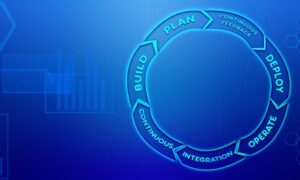Are you ready to revolutionize the way your business operates? It’s time to unlock the power of innovation through next-generation software development strategies. In today’s fast-paced world, businesses need to stay ahead of the curve, and traditional methods simply won’t cut it anymore. With cutting-edge technologies like artificial intelligence, machine learning, and blockchain on the rise, embracing these game-changing approaches is essential for success. In this blog post, we’ll explore how next-gen software development strategies can help boost productivity, increase profitability, and propel your organization into a bright future filled with unprecedented possibilities. Get ready to unlock innovation like never before.
What is Software Development and why is it Important?
Innovation is the key to success in today’s competitive business landscape. To be able to innovate, businesses need to have the ability to develop new software quickly and efficiently. This is where software development comes in. Software development is the process of creating new software or applications. It is a very important part of the innovation process, as it allows businesses to create new products or services that can give them a competitive advantage.
There are many different types of software development, but all share some common features. The first step is usually requirements gathering, where the business works out what they need the new software to do. Once the requirements are clear, the development team will start working on designing, coding and testing the new software. Once the software is finished, it will be released to users and feedback will be gathered to improve future versions.
Software development is an important part of business because it allows businesses to move quickly and stay ahead of their competition. It also helps businesses save money by avoiding expensive mistakes and delays caused by traditional methods such as waterfall development.
Agile Software Development: An Overview
Agile software development is a flexible and iterative approach to software development that allows businesses to respond quickly to changes in customer demands. The agile methodology focuses on collaboration, constant feedback, and incremental delivery of working software.
Adopting an agile approach to software development can help businesses unlock innovation and drive growth. By working in short cycles and continuously delivering working software, businesses can rapidly test and implement new ideas. The agile methodology also encourages collaboration between developers and stakeholders, which helps ensure that everyone is aligned on the project’s goals.
If you’re looking to adopt a next-gen software development strategy for your business, agile is a great option. Our team of experienced developers can help you implement agile methods and start seeing results quickly. Contact us today to learn more.
Benefits of Next-Generation Strategies
There are many benefits to next-generation software development strategies. One benefit is that they can help to unlock innovation within an organization. By using new tools and techniques, organizations can explore new ideas and bring them to market faster. Additionally, next-generation strategies can help to improve efficiency and quality across the software development process. This can lead to reduced costs and improved customer satisfaction.
Organizations that adopt next-generation strategies often see significant improvements in their overall performance. In fact, these organizations are typically able to outperform their competitors who do not use these innovative approaches. If your organization is looking for a way to gain a competitive edge, then next-generation software development strategies may be the answer.
The DevOps Approach and Other Strategies for Optimizing Software Delivery
The DevOps approach is a set of processes and practices that enables organizations to optimize their software delivery process. By automating the build, test, and deployment process, DevOps enables organizations to deliver software faster and more reliably. Other strategies for optimizing software development include Agile methodology, continuous integration/continuous delivery (CI/CD), and application lifecycle management (ALM).
Security Concerns When Deploying Next-Generation Solutions
As enterprises move to next-generation software development strategies, they need to be aware of the additional security concerns that come with these newer technologies. DevOps and microservices, for example, can introduce new security risks if not properly implemented.
To secure their next-generation solutions, enterprises should consider the following:
1. Implement a strong DevOps security strategy: Security needs to be built into the software development process from the beginning. This means creating secure coding policies and procedures, as well as incorporating security testing into the continuous integration/continuous delivery (CI/CD) pipeline.
2. Use containers wisely: Containers can help isolate applications and reduce dependencies, but they can also create new attack surfaces if not used correctly. Be sure to properly securing container images and running containers in a trusted environment.
3. Keep an eye on microservices: Microservices can offer many benefits in terms of flexibility and scalability – but they can also increase complexity and make it harder to track down issues. Make sure you have adequate monitoring and logging in place to quickly identify any potential problems.
4. Leverage automation: Automation can help streamline and secure common tasks. Choose solutions that are designed for security, or create your own security-focused automation scripts to ensure your systems are as secure as possible.
5. Invest in cloud security: Moving to the cloud can make it easier to deploy new applications – but it also brings its own set of security risks. Be sure to properly configure cloud environments, use cloud access control systems, and limit user privileges when appropriate.
Automation: Automating the Software Development Process
Automation can make the software development process more efficient and reliable. By automating key tasks, developers can focus on more important aspects of their work. Automation can also help to ensure that deadlines are met and that quality standards are met.
Quality Assurance Measures for Improved Performance
As your business looks to adopt next-gen software development strategies, it’s critical to also put quality assurance measures in place to improve performance. Here are a few key quality assurance measures you can take to drive innovation and improve performance:
1. Continuous integration and delivery: By using continuous integration and delivery (CI/CD) practices, you can automatically build, test and deploy code changes, ensuring that new code changes don’t break existing functionality. This helps to speed up the development process and reduces the risk of errors.
2. Automated testing: Automated testing is a must in order to verify the correct functioning of code changes before they’re deployed to production. By automating testing processes, you can quickly identify and fix errors, ensuring that new code changes are error-free before they go live.
3. Code reviews: Code reviews help to ensure that code changes meet standards and are error-free before they’re deployed. By conducting regular code reviews, you can catch errors early on and prevent them from making it into production.
4. Performance monitoring: Performance monitoring allows you to track the health of your system and identify any areas where performance is suffering. By constantly monitoring performance, you can quickly identify issues and implement fixes to keep your system running at peak efficiency.
Conclusion
Software development strategies have come a long way in the past few years and will continue to shape how companies approach innovation and problem-solving. By utilizing smarter frameworks, collaborative tools, cloud solutions, agile methods, DevOps best practices and more next-generation tactics, companies can unlock their true potential and drive business success. If you want to stay ahead of the game when it comes to setting up your software development strategy for maximum results, then take a look at some of these innovative new approaches that we’ve covered today.



































